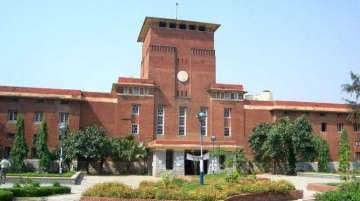As Delhi University's online open book examinations began on Monday, the teachers expressed doubts over its feasibility in the long run and also flagged the lack of guidelines to evaluate students under the latest exam mode. The varsity has maintained that it is opting for the open book examination mode as a one-time measure in view of the coronavirus pandemic.
Arun Attri, a professor of Shaheed Bhagat Singh College, said the new exam mode has ended uncertainty for over 2 lakh students who now know that since they have taken the exams, they will get their results and can apply for Masters.
He, however, said the open book exam is not a feasible option in the long run for the varsity which is known for its commerce and humanities courses.
Such exams may be feasible for engineering and science students, but won't serve the purpose for commerce and humanities courses. They are more like assignments rather than exams, Attri said.
A professor, requesting anonymity, said such a mode of examination also raises concerns over cheating and use of fraudulent means by students.
He said teachers have learnt about students sharing answers on social messaging platforms like WhatsApp.
There is no way to check such instances. The answers to many questions are easily available on the internet and students will just copy them. How do we know whether a student has actually understood what he has written? It is disadvantageous for those who actually put in hard work and prepare for the exams, the professor added.
The students are in touch with each other over WhatsApp. Even those students, who may not be willing to share answers, are forced to do so in the name of friendship. There is no way we can check this or keep a tab on it. If I get the same answer in 10 answer sheets, how am I supposed to evaluate them? another professor rued.
Delhi University Teachers' Association treasurer Abha Dev Habib said all students have the same study material.
Earlier, the students would visit libraries and take additional notes, but due to the pandemic that has not been possible. I have sent the same notes to every student and they will be relying on similar material, she said.
Abha, who teaches at Miranda House, said teachers are awaiting clarity on how they will evaluate the answer sheets.
We do not know whether we will be sent the answer sheets or given a login to the portal. We do not know which software will we be using to evaluate the answer sheets. There has been no training given to us on this, she said.
Pankaj Garg, former academic council member and a professor of Rajdhani College, concurred with Abha and said teachers will face difficulties in evaluating the examinees.
"There is a fair possibility that there would be swapping of the pages while scanning and uploading, this would disturb the sequence... teachers will have to be very careful in connecting all those pages which belong to the same question," he said.
While scanning, some pages may be blurred and it would be difficult to read them carefully. It would be equally difficult to connect to the next page and hence, the continuity of the answer would be lost, Garg said.
For teachers, the most challenging point would be marking of pages, it seems that evaluation would take much longer, he added.
Sharing the experience of giving the open book examination, a Kashmiri student of Dyal Singh College said, "I did not feel like I was giving an exam since I had access to the study material. I feel nothing can compare to the pen and paper exams because in those set-ups, we actually get to test our knowledge.
Another student said such an exam mode is "not credible" and teachers have no means to check whether the students are writing the answers or someone else in their place.
"The students are also not very serious about these exams since they have access to books. They also fail to prepare thoroughly," the student added.
Latest Education News
